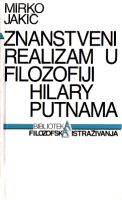

 |
prof. dr. sc. Mirko Jakić: HFD Zagreb 1993. |
PHILOSOPHY OF MATHEMATICS
An attitude about realism in mathematics accordin Putnam's general idea of realism in the science
The issue of truth
Epistemological state of mathematical theories
Possibility and necessity
Mathematical entities issue
Modal apprehention of matematics as a supplement of mathematical object-image
Putnam's attitude toward contemporary mathematical theories (mathematical 'isms', philosphical presuppositions, foundations)
The conventionalism as a modus of philosophy of science
The conventionalism as a mathematical 'ism'
Reichenbach's nonconventionalist geometry core
Grübaum's conventionalism in the philosophy of applied geometry
MEANING, FUNCTIONALISM, CORRESPONDENCEZNAČENJE, FUNKCIONALIZAM, KORESPODENCIJA
Meaning
Functionalism
Accordance of psychological functionalism theory with counterdirectionism philosophy of science
Arguments for psychological functionalism
Characteristics of ordinary materialistic conjecture, counterarguments based upon psychological functionalism
Correspondence
WITHIN-THEORY REACH, REFERENCE, A PRIORI
Toward within-theory "realism"
Meaning, reference
The problem of aprioria
Objections on founding some mathematical areas in Wittgenstein's presupposition of natural ability or form of life
ANSWERS AND SUGGESTIONS
BIBLIOGRAPHY
NAME INDEX
THE PHILOSOPHY OF SCIENCE OF HILARY PUTNAM
This book represents an attempt at a critical analysis of the philosophy of Hilary Putnam. Particular accent is given to Putnam's philosophy of mathematics, while the discussion includes only those sections of his philosophy of language, philosophy of the natural sciences and the philosophy of psychology to the extent to which they influenced his standpoint on the philosophy of mathematics. Given that the concept of realism in the philosophy of science is one of the key epistemic problems, the realistic core of Putnam's philosophy is analysed. His 'turnabout' towards anti-realism was needed as such to expressly recognise it as scientific anti-realism. This is the extent, therefore, of what this 'turning-point' meant for his own critical standpoints.
Generally, criticism is undertaken with standpoints contrary to Putnam's philosophy and includes: mathematical a priori of a genetic type, the concept of scientific realism which includes external (extra-theoretical) cause in the confirmation of scientific theories, correspondence theory as an acceptable theory of truth, the rejection of functionalism, decisiveness about the truthfulness of mathematical propositions from exclusively intra-mathematical reasons, the concept of mathematical possibility as the property of mathematically demonstrated true mathematical models, the concept of mathematical necessity as the property of the whole of researched mathematical possibilities, the conception of mathematics as an epistemically fruitful science which reveals the logical/mathematical struc-turality of the 'computing' part of the mind, the understanding of contemporary computers as contingent technological identification with a part of the human mind/brain. The undertaken criticism agrees in everything with Putnam's analysis and rejection of contemporary conventionalism.
Problematically, Putnam's philosopy of mathematics is critically analysed through his conception of scientitiflc realism, the problem of truth, the problem of abstract mathematical entities, the problem of conventionalism. Especially emphasised is the problem of the epistemological status of mathematical theories. As the central problem, we attempt to answer the question: Of what do mathematical theories speak? What reality do they reveal? And according to what is mathematics a science at all? Putnam's solution, according to which mathematical theories are given an epistemic status just changed to mathematical content, the criticism from the opposing a priori non-Platonic standpoint is subjugated. Putnam's proof through the functioning of Turing's machines in contributing to the assertion of the non-necessity of abstract mathematical entities is slowed down through the concept of self-reference with abstract mathematical entities and the assertion of the impossibility of the conception of mathematical formulas as a series of entries without significance. It is established that neither Hilbert's mathematical demonstration and formalistic formation of mathematics follows the claim of the series of signs absolutely without significance.
In opposition, Putnam's viewpoint on conventionalism as essentialistic negativism is maintained and additionally substantiated with examples from applied geometries.
The classical 'Twin Earth' problem is quasi-formalistically analysed together with the dispute over the conclusion according to which the significance of concepts cannot be the product of the mind, and that through the meaning of the concept of self-reference with abstract mathematical entities.
Special attention is devoted to the problem of the a priori, given that the standpoint on this observes that the conception of scientific knowledge is foundationally linked with the type of philosophy of science we can represent. Putnam's standpoint is analysed in the sense of excluding reasons, on account of which he changed his viewpoint several times on the problem of a priori knowledge.